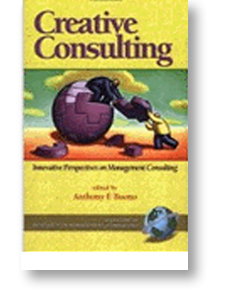Comparing psychotherapists’ and change agents’ approaches to change
In: A. Buono (ed.) Creative Consulting: Innovative Perspectives on Management Consulting - Information Age Publishing, 2004
In this chapter we explore the most prominent clusters of theories for changing organizations and changing people. Managers and management consultants make use of the first set of theories while psychotherapist use the latter. Our assumption was that there would be considerable overlap between these sets of theories.
For each cluster we described the assumptions (something changes if you…), the processes (inventions, roles, focus) and outcomes (predictability, ideals and pitfalls) providing an overview of both types of theories as well as a base for comparison. Although the roots of the theories on change and psychotherapy are different and the language varies, we discovered considerable similarities in the content of the theories and their approach. Even common trends were discernable, such as multiconceptuality, integrative designs and subject/object collusion. There appear to be interesting possibilities for change agents and psychotherapists to learn from each other’s practice and explore further cooperation. Historical precedents are identified to support this stance.
The original Dutch article received the Professional Publication Award 2002 of the Dutch Association of Management Consultancy Firms
The text can be downloaded. It is a contribution to a book ‘Creative consulting: innovative perspectives on management consulting’ edited by Anthony Buono based on recent research on management consultancy. The book consists of three parts. The first part deals with management consulting as an industry. It looks at management fashion, at the constructed nature of consultancy, at how professionalism sells, how knowledge plays a role and how the sector acts as agents of homogenization. A second part looks at trends en techniques in management consulting. It addresses the service climate, dealing with virtual teams, coaching of leaders and appreciative inquiry. A third section looks at the connection between emotion and sensemaking, at transformations, at public sector consultation, predicting client success and our chapter on therapists’ and change agents’ approaches to change.








